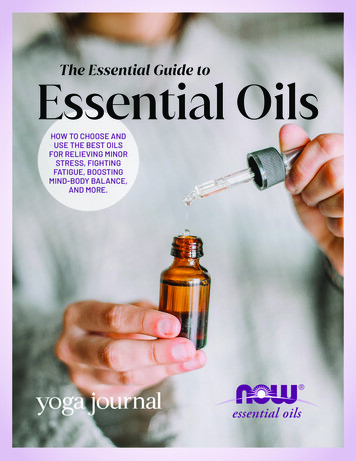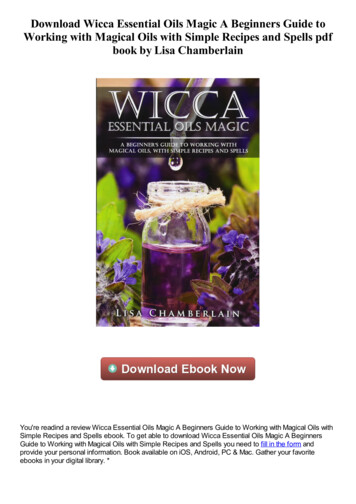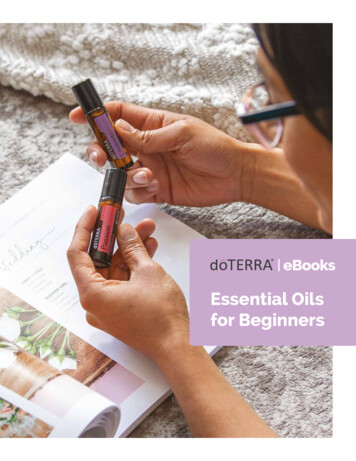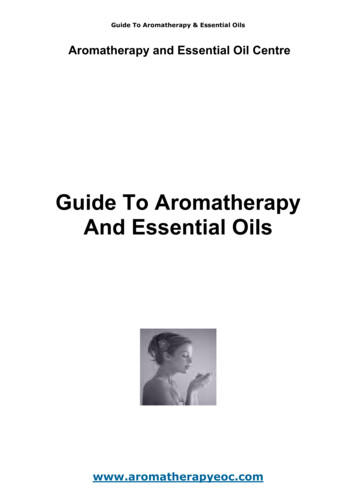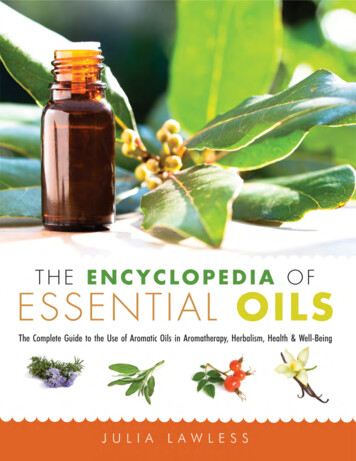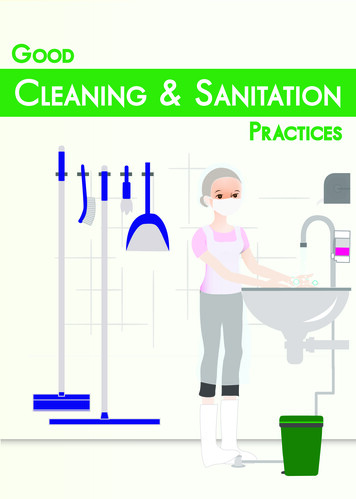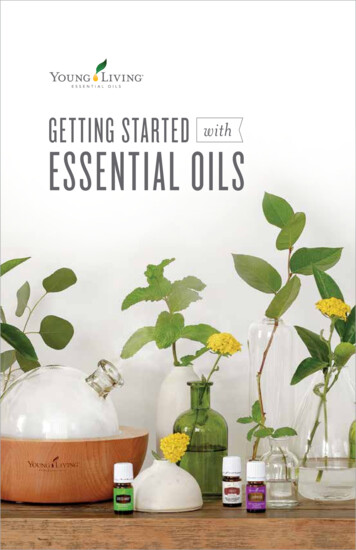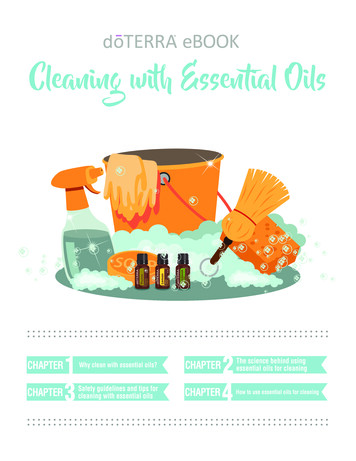
Transcription
112233Cleaning with Essential Oils112233CHAPTER Why clean with essential oils?CHAPTER Why clean with essential oils?CHAPTERCHAPTERCHAPTER Why clean with essential oils?CHAPTER The science behind usingCHAPTERessential oils for cleaningThe science behind usingessential oils for cleaningCHAPTERSafety guidelines and tips forcleaning with essential oilsCHAPTERSafety guidelines and tips forcleaning with essential oilsCHAPTERCHAPTERSafety guidelines and tips forcleaning with essential oils( Tea Tree)How to use essential oils for cleaningCHAPTERMelaleucaalternifoliaCHAPTERSafety guidelines and tips forcleaning with essential oilsThe science behind usingessential oils for cleaningCHAPTERMelaleucaCHAPTERThe science behind usingessential oils for cleaningHow to use essential oils for cleaning15 mLCHAPTERWhy clean with essential oils?How to use essential oils for cleaning1CHAPTER 2CHAPTER 1CHAPTER 3CHAPTER 2CHAPTER 4CHAPTER 3CHAPTERHow to use essential oils for cleaning1CHAPTER 2CHAPTER 1CHAPTERCHAPTER 32CHAPTERCHAPTER 43CHAPTERWhy clean with essential oils?The science behind usingessentialcleaningWhy ips forThe sciencebehindusingcleaningoilsessentialwithoils essentialfor cleaningHowto useessential oilscleaningSafetyguidelinesandfortipsforcleaning with essential oilsCHAPTER4Why clean with essential oils?The science behind usingessential oils for cleaningWhy clean with essential oils?Safety guidelines and tips forThe al oils for cleaningHow to use essential oils for cleaningSafety guidelines and tips forcleaning with essential oilsHow to use essential oils for cleaning
123CHAPTERWhy clean with essential oils?For some, cleaning is cathartic; for others it is a chore. No matter how you feel about it, cleaningis an unavoidable part of life—especially if you want to keep you and your family healthy andsafe. Having a clean environment is an important part of a healthy lifestyle, as it can help protectCHAPTERThe science behind usingessential oils for cleaningthe body from certain health issues.Whether or not you like to clean, it is much easier to keep a clean house when you have useful and effectivecleaning agents. While you may be used to the fact that people use essential oils for health and wellness, youmay not realize that essential oils can also be extremely useful for cleaning. With natural cleansing properties,essential oils provide a simple yet powerful way to keep things clean.CHAPTERSafety guidelinesandoilstipsarefor natural andEssentialcleaning withessential oilssafe to use around the familyOne of the most appealing things about using essential oilsfor cleaning is that they come from natural sources and,when used appropriately, can be safely used around theentire family. Essential oils are extracted from plant partsCHAPTERand carefully curated to preserve the potent propertiesof the oil. When you use essential oils for cleaning, youare relyingon the naturaloilschemicalcomponentsfound inHow to useessentialforcleaningthe oil to provide cleansing and purifying power. Whetheryou prefer to use natural cleaning products, worry aboutkeeping your family safe, or just want peace of mind,essential oils are a wonderful natural cleaning solution toCHAPTER1use around the home.Why clean with essential oils?
Essential oils are effective cleaning agentsbecause they are potent and powerfulWhile essential oils are found in nature, they still contain potent and powerfulcleansing properties that make them useful for household cleaning. Essential oilsare extracts taken from plant parts, which means they are highly concentratedand extremely potent. Not only do they provide a potent aroma, but the chemicalcomponents in each oil provide powerful benefits.Because essential oils are so potent, only a small amount will be necessary toprovide serious cleaning power. Other cleansing products may require a largeamount to get the job done, but it is possible to cleanse an entire area with justa few drops of an essential oil. For those who wonder if essential oils are aspowerful as other cleaning agents, simply opening a bottle of any essential oil isall it takes to immediately experience the highly concentrated, potent power ofthese natural elements.Essential oils provide an alternativeto cleaning products with dangerouschemicalsMany of the cleaning products on the market today are full of powerful yetpotentially dangerous chemicals. While these products claim to provide effectivecleansing benefits, they often contain synthetic chemicals and questionableingredients that may put your family at risk when used around the home. Thebeauty of using essential oils for cleaning is that they only contain the naturalchemical components originally found within the oil, so when used in properquantities, they do not pose a risk and are safe to be used around the house.If you have small children in the home, or just want to ensure that your family isn’tbeing exposed to unnecessary toxins and chemicals every day, essential oilsprovide a safe, natural solution for keeping the home clean.
VersatilityOne major benefit of using essential oils for cleaning is that they are soversatile—a single oil can be useful for cleaning various sections of the homeor for several difficult cleaning tasks. Typically, it requires an entire cupboardfull of different cleaning products to keep the entire house clean. Becauseessential oils are potent and effective, one oil can be used for a variety of jobs,from the kitchen to the bathroom, to purifying the air, cleaning up sticky messes,helping with laundry, and more. Essential oils can also be used to make yourown cleaning agents, allowing you to tailor each oil to your personal cleaningpreferences or needs.As mentioned, the potent nature of essential oils makes it so that you won’t needa lot of oil to complete a cleaning task. When it comes to cleaning with essentialoils, a little goes a long way, which is why many people find this to be a morecost effective solution over time.Enjoy the lovely aroma of essential oils while you cleanPerhaps one of the greatest appeals of cleaning with essential oils is that you’ll have the added benefit ofenjoying the aroma of essential oils while you clean. Many cleaning products have a strong or unpleasantsmell because they are full of synthetic chemicals and other unnatural ingredients. As you use essential oilsfor cleaning, you’ll be able to smell the lovely aroma they emit—an aroma that can last up to a few hours.Using essential oils with uplifting, refreshing, and invigorating scents will make your home feel extra clean.WHY CLEAN WITH ESSENTIAL OILS? Natural and safe to use in the home Potent, powerful, and effective Alternative to cleaning products with dangerous toxins and chemicals Offers versatile options for cleaning Creates a clean, inviting aromaNow that you understand a few of the benefits that result from cleaning with essential oils, you might bewondering, “How does it work? What is it that makes an essential oil useful for cleaning?” In Chapter 2, wewill discuss some of the science behind what makes essential oils such effective cleaning agents.
23CHAPTERCHAPTERThe science behind usingessential oils for cleaningEach essential oil has a unique set of chemical components that give theoil specific benefits. For example, some essential oils contain chemicalconstituents that make the oil useful for improving the appearance of theskin, while other oils have properties that might make it useful for repellingSafetyguidelines and tips forinsects or supporting a restful sleep.cleaning with essential oilsAn essential oil can have a combination of several different chemicalcomponents, giving each oil a diverse set of possible benefits.For example, take a look at the unique chemical profile of Lemon essential-terpineneoil, which determines the potential benefits that this oil has to offer.ß-pineneCHAPTER LEMONHowOILto use essential oils for cleaninglimonenePlant part: taken from the lemon peelMain chemical constituents: limonene, ß pinene, γ-terpinenePossible benefits:Limonene55-75% (percent composition)1CHAPTER 2CHAPTER 3 Uplifting, energizing aromaSurface, teeth, and skin cleansing propertiesMay help reduce appearance of skin blemishesInternal cleansing properties*Can support a healthy metabolism*Supports respiratory, immune, gastrointestinal, and nervous system function*CHAPTERWhy clean with essential oils?beta-pinene (ß pinene)6-18% (percent composition)The science behind usingessential oils for cleaning Supports immune function and response* May help maintain healthy blood glucose levels already in the normal range* Supports healthy respiratory system*gamma-terpinene (γ-terpinene)3-16% (percent composition) Surface cleansing properties Protects against environmental threatsSafety guidelines and tips forcleaning with essential oils
While these are only three of the main chemical constituents found in Lemonessential oil, it is easy to see how the unique chemical makeup of the oildetermines the possible benefits it has to offer. Because Lemon oil has ahigh percentage of chemical constituents with surface cleansing benefits, itis a useful oil for household cleaning (among other things). Other essentialoils may have a small percentage of cleansing chemical properties, but theymight have a high percentage of chemical constituents that make themuseful for something else, like reducing the appearance of skin blemishes, ornaturally repelling insects.The beauty is that each essential oil has a completely unique chemicalprofile with different percentages and combinations of all kinds of chemicalcomponents—this is why essential oils are so versatile and have so many uses!*These statements have not been evaluated by the Food and Drug Administration. This productis not intended to diagnose, treat, cure, or prevent any diseaseCleansing propertiesThere are many essential oils that contain chemical properties that are knownto provide cleansing benefits. Essential oils with cleansing properties can beused as natural cleansing agents, especially if they have a high percentage ofchemical constituents that are known to be beneficial for cleansing. Remember,high quality essential oils are extremely potent, which means that even a smallamount of a cleansing essential oil can provide major benefits.Chemical constituents that providecleansing benefitsWhile many essential oils contain cleansing chemical components, the mostbeneficial oils for cleaning are those with a high concentration of cleansingchemical constituents. The unique combination of chemical constituents inany essential oil will depend on what kind of plant it comes from—each plantproduces a different essential oil with its own set of chemical components andthus, its own set of benefits. Because some essential oils will have a higherpercentage of chemical components with cleansing benefits than others, theseoils are more effective for household cleaning.Let’s take a look at some of the chemical constituents that have cleansingproperties, and which essential oils contain high concentrations of thesechemical components.
OHPHENOLSThe chemical structure of phenols makes them extremely potent and rich inantioxidants when found in essential oils. Phenols commonly found in essentialoils include thymol, carvacrol, eugenol, and antheole. Phenol-rich essential oilsthat can be useful for cleansing due to their chemical properties include:CloveOreganoThymeALDEHYDESAlthough aldehydes are typically only found in small quantities within plants,they are known for providing essential oils with a powerful aroma. Aldehydes likecinnamaldehyde and geranial are frequently found within essential oils. Essential oilsrich in aldehydes that are also useful for cleansing purposes include the TERPENESMonoterpenes are hydrocarbons that are frequently found in essential oils andprovide oils with numerous benefits. Common monoterpenes found in cleansingessential oils include limonene and terpinene. The following essential oils containmonoterpenes that make them useful for cleansing.BergamotLemonLimeMelaleucaWild OrangeH3CCH2The following table summarizes the different types of chemical constituents thatcan be useful for cleaning, and in which essential oils they may be found:PHENOLSALDEHYDESMONOTERPENESEssential oilChemical constituentsPossible benefitsCloveThymol, CarvacrolSurface cleansing, protects against environmentalthreats, antioxidants*OreganoEugenolSurface cleansing, protects against environmentalthreats, antioxidants*ThymeThymol, CarvacrolSurface cleansing, protects against environmentalthreatsCassiaCinnamaldehydeProtects against environmental threatsCilantroDecenalSurface cleansingCinnamonCinnamaldehydeProtects against environmental threatsMelissaGeranialProtects against environmental threatsBergamotLimonene, TerpineneCleansing propertiesLemonLimonene, PineneCleansing propertiesLimeLimonene, TerpineneCleansing propertiesMelaleucaTerpineneCleansing propertiesWild OrangeLimoneneCleansing properties*These statements have not been evaluated by the Food and Drug Administration. This product is not intended to diagnose, treat, cure, or prevent any disease
Essential oils have different types of “cleansing” propertiesIt is important to keep in mind that there are many essential oils that are known to have cleansing properties;however, the word “cleansing” can have many different meanings. Some essential oils have chemicalcomponents that will provide cleansing benefits for the skin. Other oils may have a chemical profile that makethe oil useful for internal cleansing.* When it comes to household cleaning, the best essential oils are thosewith properties that are useful for surface cleansing.Remember that each essential oil has adifferent and unique combination of chemicalconstituents. Some essential oils may havechemical components that are generally“cleansing,” but they may not be particularlyuseful for surface cleansing. Other essential oilsmay contain cleansing properties that are usefulfor cleaning surfaces; however, if these chemicalcomponents only appear in small amounts,it is better to use an essential oil with higherpercentages of chemicals that are useful forcleansing surfaces specifically.When determining which essential oils to use for cleaning around thehouse, look for essential oils that contain “surface cleansing” benefits.*These statements have not been evaluated by the Food and Drug Administration. This product is not intended to diagnose, treat, cure, or prevent any disease
3CHAPTERSafety guidelines and tips forcleaning with essential oilsBefore you begin to incorporate essential oils into your cleaning routine, it is important to understanda few safety guidelines that will help you use the oils in a safe, effective way. Essential oils are safe toCHAPTERHowto useessentialoils forcleaningappropriate application methods.By followingsuggestedsafety guidelinesand usagetips, you canuse in the home and around the family, but they should always be used in proper amounts and withensure that you protect your family, while naturally and successfully cleaning your home.Use pure essential oils for the best results1CHAPTER 2CHAPTER 3CHAPTER 4CHAPTERIt is important to remember that not all essential oils are equal when it comes toWhy clean with essential oils?quality and efficacy. Using pure, high quality essential oils that have been takenfrom natural sources will yield the best results when using oils for cleaning. Lowquality oils or oils that contain synthetic fillers will not be as effective for cleansingpurposes, and because they are less pure, more oil will be required to accomplishThe science behind usingessential oils for cleaningcertain cleaning tasks. When using pure, potent essential oils, very little oil will berequired to provide powerful cleansing benefits.In addition to providing the most benefits, high quality essential oils will also be saferto use around the family. High quality essential oils typically go through rigorousSafety guidelines and tips forcleaning with essential oilstesting to ensure that they are safe for consumer use. To save time and moneyduring production, some companies will forego testing, which lowers the quality ofthe oil and does not allow them to guarantee the safety of the product. When used inproper amounts, high quality essential oils are safe to use in the home, and you willhave peace of mind knowing that the oils you are using hold true cleansing benefits.When choosing essential oils to use for household cleaning, make sure that the oilsHow to use essential oils for cleaningare pure, high-quality, come from natural sources, and do not contain any syntheticfillers or contaminants.
WHAT TO LOOK FOR WHEN CHOOSING A HIGH-QUALITY ESSENTIAL OILYESNO taken from natural resources doesn’t come from pure sources thoroughly tested synthetic fillers high level of purity untestedOnly a small amount of essential oil is neededDon’t forget, if you are using pure essential oils that are high in quality, only a smallamount will be necessary when cleaning around the home. Especially if you plan tocombine several essential oils together, you will only need a small amount to reap thedesired cleansing benefits. When using essentials for cleaning, remember: you canalways apply more oil if necessary but once you use too much oil, it is difficult to takeit back. This is particularly important to remember when making your own cleaningagents. You can always add more drops of an essential oil to the solution, but you can’ttake them out once they are added, so start small. Keep in mind that when it comes tocleaning with essential oils, a little goes a long way.MAKING YOUR OWN CLEANING SOLUTIONS AT HOMEEssential oils can be combined with a number of household ingredients to make yourown cleaning agents. Consider using the following ingredients when making your ownnatural cleaning agents at home:WHITE VINEGAR: Contains purifying properties. Useful for cleaning grease and mineral deposits.BAKING SODA: Useful for absorbing and eliminating odors, and cleansing surfaces in the home.SALT: Known as an effective scrubbing agent. Useful for cleaning stains and greasy messes.CASTILE SOAP: Helpful for lifting dirt, stains, and grease.Any of the cleaning agents above can be combined with essential oils for variouscleaning tasks throughout the home.
How many drops of oil do I need?There are several methods for using essential oils for cleaning, but when it comesto making your own cleaning solutions, you might be wondering how much ofan essential oil to add. The amount of oil you add to your cleaning solution willdepend on the particular job at hand, what kind of surface you plan to apply themixture to, and how severe the mess is. For example, if you are simply cleaning thesurfaces around the home, you will need less oil compared to if you are trying toscrub away a greasy mess or stubborn buildup.Here is a general guide to help you know how much of an essential oil to add toyour homemade cleaning solution.STRONG – 5 (or less) dropsSTRONGER – 10–15 dropsof essential oil, 2–3 cups ofof essential oil, 3–5 cups ofcleaning solution. For simplecleaning solution. For tougherjobs like cleansing surfacestasks like stains, grease,and wipe-away messes.sticky messes, and scrubbing.?STRONGEST – 20 drops.This is for particularly pesky ordifficult cleaning jobs. Keep inmind that this amount of oil willallow the scent of the essentialoil to come through, and it willbe extremely potent.Test before cleaningWhen using essential oils for cleaning, it is always wise to test the oil or yourhomemade essential oil cleaning solution on a small area before applying alarge amount. Testing the cleansing solution on a small, inconspicuous areawill allow you to see how the essential oils react with certain kinds of wood,fabric, granite, etc. This is an especially smart practice if you have uniquetypes of furniture, carpet, wood, or other areas in your home that you areworried about ruining with cleaning agents.
StoragePart of safe essential oil use (in any capacity)( Tea Tree)15 mLMelaleucaalternifoliaMelaleucais ensuring that the oils are stored safely andresponsibly. Because essential oils are so potent,young children do not understand how best to usethem, and thus they can pose a threat if children tryto use the oils without supervision. Many parentsstore regular cleaning products in hard-to-reachplaces or areas that children cannot get to in orderto keep them safe from improper exposure oringestion. Be sure to do the same with essential oilsand any homemade essential oil cleaning solutions.Make sure that your children cannot access oils orcleaning solutions without your knowledge in orderto keep them safe from improper exposure.In addition to keeping essential oils in a safe place, it is also best to store the oils in a cool, dry place in orderto preserve the natural chemical properties within the oils. Essential oil properties are best preserved whenstored in dark bottles in order to keep UV rays and other types of light from altering the chemical composition.When storing your own essential oil cleaning agents, the chemistry of the oils will be preserved best in a glassor stainless steel container. Solutions should not be stored long-term in plastic.If you choose to make your own essential oil cleaning solutions and store them for future use, keep in mindthat oil and water don’t mix, so you might have to shake the cleaning solution vigorously before using again.When an essential oil cleansing solution sits in the cupboard, it is possible for the oil to separate from theother cleaning agents, so be sure to shake well before each use to ensure effective cleaning.BEST PRACTICES FOR CLEANING WITH ESSENTIAL OILS Use high quality essential oils A little oil goes a long way The amount of oil you need will depend on the type of cleaning job Test a small area before cleaning with essential oils Practice responsible storage For homemade essential oil cleaning agents, always shake well before each use
3CHAPTERHow to use essential oils for cleaningOnce you are equipped with a basic knowledge of essential oil safety guidelines, it is time to1CHAPTER 2CHAPTER 3CHAPTER 4start cleaning! As mentioned, there are many essential oils that possess chemical constituentsCHAPTERWhycleanwith essentialoils?with cleansing properties, but some are moreusefulfor householdcleaning thanothers. Todetermine which essential oils will be most effective for cleaning around the house, take a lookat the following list.The science behind usingessential oils for cleaningESSENTIAL OILS WITH PROPERTIES THAT ARE USEFUL FOR HOUSEHOLD ntroCinnamon BarkSafety guidelines and tips forcleaning with sLemonLimeHow toMelaleucauseMyrrhOreganoPetitgrainSiberian FirThymeessentialoils forWild OrangecleaningAfter setting aside a few oils that are useful for cleaning, you are ready to tackle nearly any pesky cleaning jobaround the house. Here are some of the easiest ways to use essential oils for cleaning:Cleansing the air and dispelling odorsOne of the best uses for essential oils around the house is to help cleanse the air by creating a lovely, invitingsmell. Not only can you use essential oils with cleansing properties to promote clean air within the home, butyou can also dispel unpleasant odors by replacing them with the potent aroma of essential oils.
SOME OF THE BEST ESSENTIAL OILS FOR CLEANSING THE AIR eucaThymeWild OrangeTry adding these oils to an essential oildiffuser in any area of the home to helpdispel unwanted odors, or to tusPeppermintMelaleucaCinnamonCloveWild OrangeLavenderRosemaryEucalyptusclean, breathable air. You can also combineseveral essential oils into a single diffuserto create a custom aroma. Try any of thefollowing oil combinations for a unique andrefreshing scent:
In addition to diffusing essential oils throughout the home, you can also make your own essentialoil room spray to help promote an inviting and pleasant scent in any room.ESSENTIAL OIL ROOM SPRAYINGREDIENTS20 drops Lemon oil20 drops Grapefruit oil20 drops Lime oilDistilled waterINSTRUCTIONS1. In a glass spray bottle, add essential oils and top with water. Depending on the size of the spraybottle, you may wish to add more essential oils.2. To refresh a room, shake the bottle well, and spray liberally.INSTALL A NEW AIR FILTERThe quality of air in your home can be determined by the age and condition of your air filter. If it has been awhile since you last changed the air filter in your home, consider changing it out for a new one. When you go toput in a new air filter, add a few drops of an essential oil to the filter to help purify the air throughout the home.Instead of spraying commercial air fresheners with questionable ingredients all around your home,you can make your own natural air freshener using just baking soda and essential oils.NATURAL AIR FRESHENERINGREDIENTS¼ cup baking soda5–6 drops essential oilINSTRUCTIONS1. Put ¼ cup baking soda into a small Mason jar. Add 5–6 drops of your favorite dōTERRA essential oil.2. Put a piece of fabric over the jar opening and seal with jar band.3. To keep an area smelling fresh, place the jar on a solid surface and shake often to activate the fresh scent.4. If the scent starts to fade, simply add 2–3 drops of essential oil to the jar.
If you enjoy having potpourri around the house, you can easily incorporate essential oils into yourpotpourri recipe to give any room an inviting aroma.ESSENTIAL OIL POTPOURRIRECOMMENDED INGREDIENTSOrange peelsStar aniseBay leavesCinnamon sticksVanilla beans (cut into small pieces)Cardamom seedsDried apple slicesCandied gingerWhole clovesAll spiceWhole nutmegRECOMMENDED OILSCinnamon BarkCassiaVetiverWild OrangeCloveGingerCardamomINSTRUCTIONS1. Place desired herbs and spices into a container or bowl. Mix and assemble as desired.2. Add 3–5 drops of essential oil on top of potpourri.3. After a couple weeks, the aroma will start to fade. Add a few more oil drops to revive the scentCleansing surfaces around the homeAs discussed in Chapter 2, many of the “cleansing” properties in essential oils make themuseful for cleansing surfaces throughout the home. When you are in a hurry, you can simplyadd a small dab of an essential oil like Lemon or Bergamot oil to a wet cloth or rag and wipedown surfaces in the kitchen or bathroom.
For routine cleaning, consider creating your own essential oil cleanser that will make it easy toclean the most popular surfaces in your home.ALL-PURPOSE CLEANSING SPRAYINGREDIENTS1 cup warm water1 cup white vinegar20–25 drops essential oil (use an oil dropper if you want an exact number of drops)INSTRUCTIONS1. In a spray bottle, combine water and vinegar.2. Add essential oil(s) of choice. Shake well.3. Use on counters, wood, glass, stainless steel, and porcelain.4. Wipe with a microfiber cloth or paper towel.KitchenBecause there are so many surfaces in the kitchenthat get used every day, essential oils can beextremely helpful for keeping the kitchen clean. Asa bonus, every time you clean the kitchen usingessential oils, it will leave behind a lovely smell—making it feel twice as clean!
For routine cleaning, consider creating your own essential oil cleanser that will make it easy toclean the most popular surfaces in your home.KITCHENREFRIGERATOR AND MICROWAVE CLEANSERINGREDIENTS1 cup white vinegar2 cups hot water15 drops Lemon oilINSTRUCTIONS1. Combine the ingredients in glass spray bottle.2. Spray mixture inside fridge or microwave, then scrub and wipe using damp cloth.The garbage disposal is a typical culprit for unpleasant smells in the kitchen. Consider making thesegarbage disposal refreshers to allow the revitalizing scent of essential oils to save your kitchen sinkfrom unwanted aromas.KITCHENGARBAGE DISPOSAL REFRESHERSINGREDIENTS2 cups baking soda1 cup salt½ cup water⅓ cup unscented liquid castile soap30 drops Lemon, Spearmint, or Tangerine oilNote: Liquid castile soap is a vegetable-based soap commonly found in health food stores.INSTRUCTIONS1. Combine baking soda and salt into bowl.2. Add castile soap and essential oil into mixture.3. Add water one tablespoon at a time while stirring with hands until it forms into the consistency ofdamp sand. It should stay together when you press it together. If you add too much water, just addsome more baking soda and salt until the consistency is right.3. Grab a tablespoon measurement device and scoop packed spoonfuls onto parchment paper.4. Once the mixture has been scooped, let dry for 24 hours or until they are hard. One batch shouldmake about 36 garbage disposal refreshers.5. Once hard, put into glass jar or container, and use the next time you do dishes. Just put 1–3 refreshersinto the garbage disposal and turn it on. You will immediately smell the refreshing essential oils.A stale, dirty refrigerator can also contribute to gross odors that stink up the whole kitchen. Whenyour fridge needs a little pick-me-up, place one of the garbage disposal refreshers from the DIYrecipe above in your refrigerator for extra freshness. One pod will last up to a month in the fridge.When the scent fades, replace it with a new refresher to keep your fridge smelling lovely.
Whether you need to get rid of caked-on food, or just want your stove top to sparkle like it oncedid, this DIY stove top cleaner can help you get the job done.KITCHENSTOVE TOP CLEANERINGREDIENTS¼ cup baking soda¼ cup table salt1 tablespoon apple cider vinegar2 tablespoons water4–5 drops of essential oil (try Lemon, Lime, Melaleuca
The beauty is that each essential oil has a completely unique chemical profile with different percentages and combinations of all kinds of chemical components—this is why essential oils are so versatile and have so many uses! *These statements have not been ev

